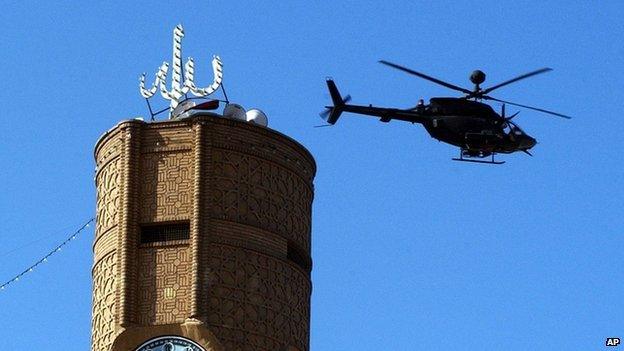US anchor Brian Williams apology for Iraq helicopter story
- Published
Brian Williams: "I made a mistake in recalling the events of 12 years ago"
One of America's most famous news anchors has apologised after a story he repeatedly told about coming under fire in Iraq was revealed to be untrue.
NBC's Brian Williams said he was on a helicopter forced down in 2003, but veterans have now disputed his account.
Mr Williams, the most-watched network anchor in the US, has often recounted his experience but now blames the "fog of memory".
"I made a mistake in recalling the events of 12 years ago," he said.
"I want to apologise. I said I was travelling in an aircraft that was hit by RPG [rocket-propelled grenade] fire. I was instead in a following aircraft."

American helicopters frequently came under attack during the Iraq war
He said his account was "a bungled attempt by me to thank one special veteran and by extension our brave military men and women, veterans everywhere, those who have served while I did not."
Mr Williams repeated the story as recently as Friday, describing his ordeal on TV while paying tribute to a retired soldier who helped protect the grounded aircraft and crew.
His apology came after veterans who were on the helicopter that was hit posted comments on the broadcaster's Facebook page, external.

Analysis
Anthony Zurcher, BBC News, Washington
Just last month, following the surprise success of American Sniper, discrepancies in some of the stories recounted by the central figure in the film - US soldier Chris Kyle - resurfaced.
The ideological shoe was on the other foot in that case, as liberals accused Kyle of being a serial exaggerator and braggart and used it to question the credibility of the Oscar-nominated film.
The Williams story is different, however, because of the currency of truth on which the media depends.

Flight engineer Lance Reynolds, who was on the helicopter that was hit, wrote: "Sorry dude, I don't remember you being on my aircraft. I do remember you walking up about an hour after we had landed to ask me what had happened.
In a later posting he wrote: "The place we were shot at was a long ways away from where we even saw him and his crew. "
Replying to the criticism, Mr Williams said that "constant viewing of the video showing us inspecting the impact area - and the fog of memory over 12 years - made me conflate the two".
Mr Reynolds told the military newspaper Stars and Stripes, external: "It was something personal for us that was kind of life-changing for me. I know how lucky I was to survive it."
"It felt like a personal experience that someone else wanted to participate in and didn't deserve to participate in."
In an interview with CNN on Thursday, a pilot of the helicopter Mr Williams was on in 2003 said their aircraft had taken some fire but was not hit by an RPG.
The hashtag #chopperwhopper has now appeared on Twitter, with many contributors criticising Mr Williams and questioning whether he should stay in his job.
"Nobody's trying to steal anyone's valour," Williams wrote. "Quite the contrary: I was and remain a civilian journalist covering the stories of those who volunteered for duty."
Some in the US media say Mr Williams' admission could harm his career.
"At least in the short term, the false story may damage the anchor's most valuable asset - his credibility," media reporter Paul Farhi wrote in The Washington Post, external.
NBC has not said whether Mr Williams would face disciplinary proceedings, the Post reports.